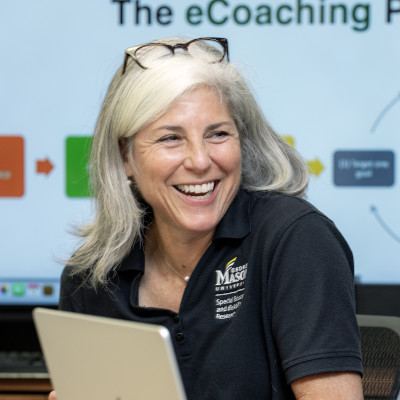Special Education Faculty Lead TTAC Projects that Facilitate Positive Outcomes for Children and Youth with Disabilities
May 20, 2025
Faculty in the Special Education Program within the College of Education and Human Development (CEHD) at George Mason University lead projects that provide a crucial link to school communities and families in Northern Virginia. One example is the Virginia Department of Education (VDOE) Region 4 Training and Technical Assistance Center (TTAC) that provides training and technical assistance to educators who support children and youth with disabilities. George Mason’s TTAC is a VDOE grant funded initiative and is part of a network of seven TTAC projects located in universities across the Commonwealth. The TTACs were established to increase opportunities and outcomes for children and youth with disabilities from birth through the age of 22. TTAC at George Mason serves Superintendent Region 4, which includes 19 different public-school divisions in Northern Virginia, through two grants: TTAC School Age and TTAC Early Childhood. Leading TTAC operations at George Mason are Principal Investigators Christan Coogle (Early Childhood) and Margaret Weiss (School Age), both of whom are associate professors in the Special Education Program at George Mason. Karen Berlin and Jennifer Sassano serve as Co-Directors of the school age TTAC and Amber Gant serves as Associate Director of the early childhood TTAC.
TTAC supports the activities of VDOE in implementing the Individuals with Disabilities Education Act (IDEA). Coordinators provide high quality professional development and technical assistance to increase the knowledge and skills and improve the practices of school division educators, providers, and individuals who educate and provide services for children and youth with disabilities. The services of TTAC include resource development, professional learning, coaching, and individual support that is customized to meet the unique needs of school divisions in developing special education instructional and intervention programs based on evidence-based, high leverage practices.
The TTAC projects administered under the VDOE grant equip Virginia schools and educators with the training, tools, and practices that are required to facilitate positive outcomes for students with disabilities. As described on the VDOE website, these include:
- Setting high expectations for students with disabilities and including these students in all school-related activities;
- Ensuring collaboration among Individualized Education Program (IEP) team members to develop and implement meaningful IEPs;
- Aligning the curriculum with state learning standards and ensuring that the curriculum is taught in all settings;
- Facilitating collaboration among special and general education teachers in planning and delivering research-based, effective, and differentiated instruction;
- Providing students with access to appropriate assistive technology as needed; and,
- Incorporating positive behavior supports into a school-wide approach to discipline.

Christan Coogle
Coogle and Weiss shared their thoughts on the overall mission of George Mason’s TTAC. Weiss emphasized that TTAC services provide teachers with a strong foundation from which they can build the skills and knowledge needed to support students with disabilities. She stated, “Given the current increase in novice and provisionally licensed teachers in Virginia public school classrooms, providing timely, high-quality professional learning and coaching is more critical than ever. George Mason’s TTAC serves as an effective bridge between research and practice, offering a continuum of services that build the capacity of both pre-service and in-service teachers to implement High-Leverage Practices (HLPs) and specially designed instruction (SDI) to increase the achievement of students with disabilities.”
Coogle highlighted the importance of the differentiated supports and resources available through TTAC that strengthen the ability of teachers to deliver services to young learners with developmental delays or disabilities. She stated, “Young children with disabilities receive their education and special education services in a variety of settings such as Head Start Programs, VPI settings, community care, and public-school classrooms. Educators in these settings have a variety of experiences and backgrounds. For this reason, there is a critical need to ensure all educators have the unique and differentiated supports and resources needed to implement practices associated with the most current evidence available such as the Division for Early Childhood Recommended Practices with fidelity. These practices provide practical guidance to deliver SDI within early childhood settings, and this is important for children identified with delays and disabilities as these are the practices that have the highest probability of improving outcomes for these young learners.”
TTAC offers three tiers of services, all at no cost to schools and individuals in Virginia. Tier One includes universal supports and publicly available informational resources that can assist school personnel, service providers, and families in enhancing their knowledge and expertise in evidence-based practices, strategies, and interventions that will help students with disabilities achieve success. This includes TTAC Online, a site where individuals can search for a wide range of resources by age level, category, disability area, or topic. The TTAC Online website includes sections on Virginia Projects, Virginia Assessments, Disability Information, Resources, Events (trainings, conferences, and webinars/webcasts), and Online Training. It is available 24/7 to teachers, service providers, and families.
Tier One services also include newsletters and links to websites such as the Assistive Technology Network, Virginia Family Special Education Connection, LEADS, and other sites that provide beneficial information and resources on disabilities. To illustrate how these resources support practice, the primary purpose of the LEADS website is to provide resources and tools to enhance Local Education Agencies’ collection, reporting, and analysis of Early Childhood Special Education Indicator data (Indicator 6, Early Childhood Educational Environment; Indicator 7, Child Outcomes; and Indicator 12, Transition from Part C to Part B). Further, the resources support use of state- and division-level data to make program changes which lead to improved child outcomes. Resources on the website focus on (a) enhancing the quantity and quality of inclusion of children with disabilities, (b) improving outcomes through a curriculum framework, (c) supporting the transition from Early Intervention to Early Childhood Special Education, and (d) increasing knowledge of the state and federal regulations that govern Early Childhood Special Education.
Tier Two services are targeted for specific groups or topic areas. These most often include professional learning communities, communities of practice, networks, or focus groups. Membership in these groups is based upon a particular VDOE priority. Each group convenes regularly for professional learning, networking, and to share resources and the experiences of individuals belonging to the group. Through communities of practice and professional learning events, TTAC reaches and connects populations of teachers who may not have an internal network of support, due to the unique nature of their roles. The communities of practice at George Mason’s TTAC focus on literacy, mathematics, inclusive practices, high leverage practices, Virginia Tiered Systems of Supports (VTSS), significant disabilities, assistive technology, early childhood, and transition services. Educators who participate in these communities of practice benefit from learning about how evidence-based practices can be applied to real life situations. Detailed information on each of these communities of practice can be found on George Mason’s TTAC website.
Tier Three services include professional learning or coaching provided to individual school divisions through collaboratively developed service agreement plans. These plans include mutually agreed upon goals that are aligned with a division’s strategic action plan or a school’s continuous improvement plan. The service agreement details how TTAC will support the increase of internal capacity of school professionals in supporting students with disabilities. TTAC Tier Three services are delivered in a variety of formats including virtual—both synchronous and asynchronous—in-person, and hybrid. Throughout this process, TTAC representatives report on progress and action taken toward accomplishing goals spelled out in the agreement with the school division.
Universally, all of the teachers who had access to the job-embedded coaching through TTAC praised the support they received and described how the experience promoted their professional growth. One educator commented, “The most beneficial part of our partnership with TTAC was the relationship we built over the course of time we worked together. This experience has been life changing for me and I will forever be grateful for the learning opportunity and connections I’ve made. The collaborative effort was further strengthened because TTAC offered a safe and risk-free learning environment. We were able to ask thought provoking questions and reflect deeply on our implementation of science of reading practices. The resources provided by TTAC throughout were top notch, user friendly, and research based. TTAC Coordinators are experts in the field, and I greatly appreciate their expertise and advice as we accomplished our action item steps. Literacy at our elementary school has completely changed and it is due in large part to this partnership.”

Margaret Weiss
Weiss and Coogle offered their observations on what services provided by the Region 4 TTAC are most needed in Northern Virginia schools and where TTAC is having the largest impact in improving academic outcomes for students with disabilities. Weiss stated, “High-quality professional development and coaching in HLPs, SDI for literacy, mathematics, behavior, and transition, as well as the embedded use of assistive technology (AT) and augmentative and alternative communication (AAC), co-teaching and inclusive practices, and Multi-Tiered Systems of Support (MTSS) are key areas where George Mason’s TTAC is making a significant impact. These efforts in building the capacity of Region 4 school division personnel yield improved results in both academic achievement and post-secondary outcomes for students with disabilities throughout our region.”
Coogle provided her perspective on the success of TTAC in facilitating the use of inclusive practices in schools throughout the Northern Virginia region. She stated, “Our work is focused on increasing the number of inclusive classrooms and supporting educators to use effective, inclusive practices aligned with the Division for Early Childhood’s Recommended Practices. We curate individualized resources and supports to improve fidelity and overcome challenges associated with (a) muti-tiered systems of supports, (b) multiple modes of assessment, (c) quality educator and child interactions, (d) increasing access and participation, and (e) providing embedded learning opportunities, all of which are needed to create quality, inclusive environments. TTAC’s impact in partnership with the community is clear by the increase in quality, inclusive classrooms across our region.”
The passion that Weiss and Coogle bring to TTAC is rooted in their many years of research on teaching practices that improve educational outcomes for young children with disabilities. Weiss explained, “Having both TTAC and teacher preparation programs at George Mason provides a unique opportunity for innovation and research on effective teaching practices, both how we teach and develop these practices in pre-service and how we support their use with in-service teachers. As a researcher in teacher education, it has been an exciting opportunity to develop a common language with HLPs and focus with specially designed instruction that will improve instruction and benefit students with disabilities.”
Coogle added, “While the use of the typical one size fits all, professional development approach may increase knowledge, it tends to be quite ineffective in supporting practice and thus ineffective in improving child/student outcomes. Having the opportunity to identify how to effectively support practice and improve fidelity in both preparation and technical assistance is a luxury that is unique to us, at George Mason, and I very much so appreciate and value the multiple partners including research participants, the Virginia Department of Education, our amazing TTAC team, and our regional community to reach a common goal which is to improve outcomes of young children experiencing delays and disabilities.”
The activities of TTAC at George Mason exemplify the important role that CEHD faculty play in enhancing the skills of educators in Northern Virginia that will better enable them to optimize academic outcomes for students with disabilities. For more information, please visit George Mason’s TTAC website.
